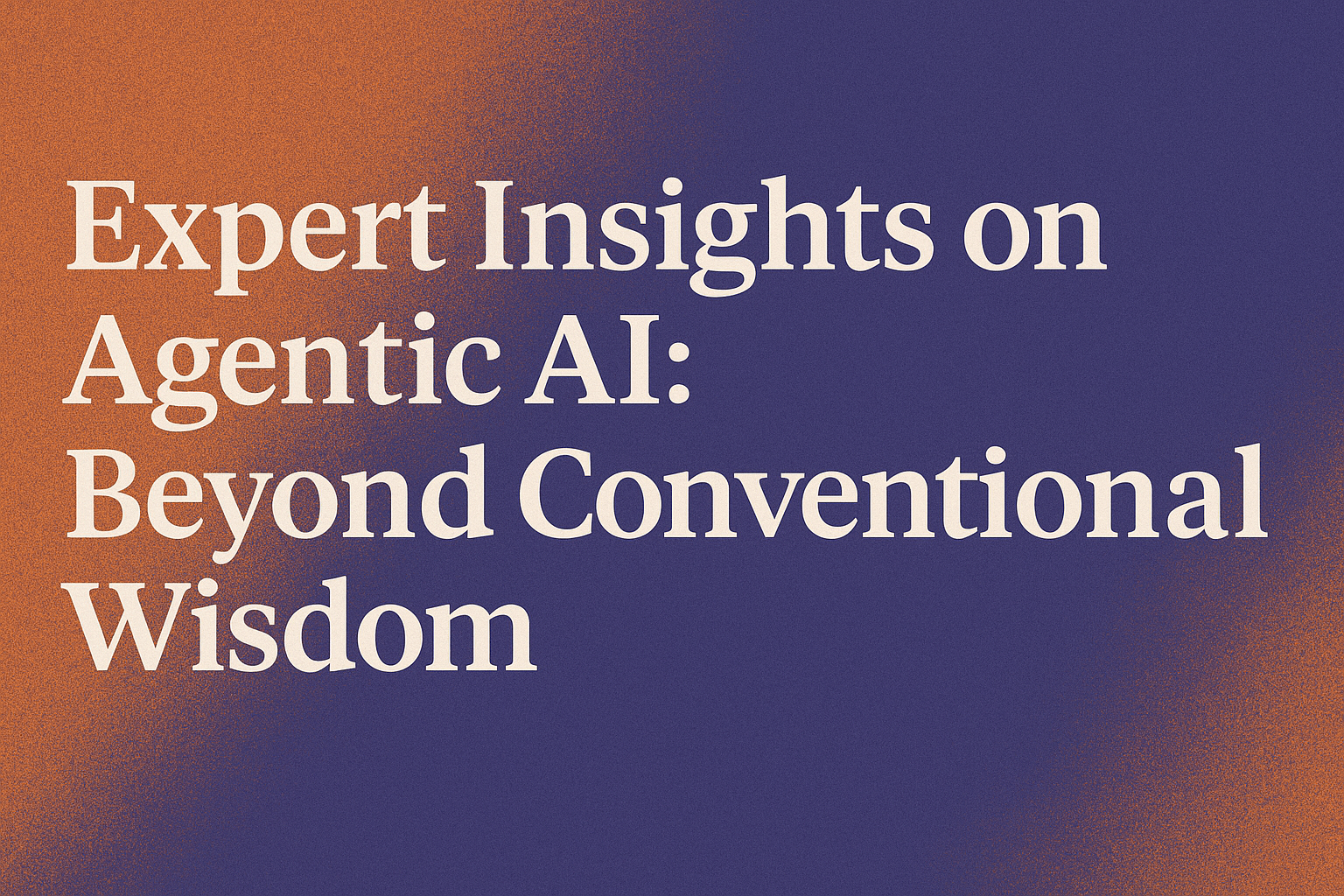
Expert Insights on Agentic AI: Beyond Conventional Wisdom
The concept of Agentic AI has moved from science fiction into the reality of real-world application.
Unlike traditional AI systems designed to execute specific tasks based on pre-set instructions, Agentic AI operates independently, setting goals, adapting to changes, and making decisions autonomously.
As businesses and researchers look to harness the power of this technology, understanding its deeper potential requires breaking away from conventional wisdom and exploring the expert insights driving its development.
In this blog, we’ll uncover how Agentic AI is reshaping industries, highlight the breakthroughs fueling its growth, and explore its game-changing potential to address global challenges.
What Sets Agentic AI Apart?
To appreciate Agentic AI’s impact, it’s essential to grasp what distinguishes it from conventional AI. Traditional AI systems are often task-driven and reactive.
For example, a chatbot may respond to customer queries but cannot act beyond its programmed scope.
Agentic AI, however, operates with autonomy and purpose.
It goes beyond following instructions—it learns, adapts, and executes decisions with minimal human involvement.
The shift is from being a passive tool to an active agent capable of dynamic problem-solving.
For example, self-driving cars with Agentic AI not only follow traffic laws but also make context-driven decisions—such as re-routing to avoid accidents or dynamically coordinating with other vehicles to reduce congestion.
Expert Insights Driving Agentic AI Development
From Automation to Autonomy
According to AI thought leaders, the transition from automated systems to autonomous agents represents a fundamental shift. This evolution is driven by advancements in:
- Reinforcement learning: AI agents learn by interacting with their environment and optimizing actions for desired outcomes.
- Natural language understanding: Systems like OpenAI’s GPT models enable agents to comprehend and generate human-like responses, enhancing interaction.
- Edge AI computing: Decentralized processing allows AI agents to function autonomously without constant reliance on cloud infrastructure.
These advancements enable Agentic AI to make nuanced decisions that reflect human-like problem-solving.
Expert View on Industries Adopting Agentic AI
Agentic AI is poised to impact a wide range of sectors:
- Healthcare: Intelligent agents can autonomously analyze patient data to recommend personalized treatment plans, monitor vitals in real time, and adapt to changes in patient conditions without physician intervention.
- Finance: Autonomous trading systems use real-time market analysis to make profitable trades, while fraud detection agents proactively monitor transactions and flag anomalies.
- Supply Chain: AI agents dynamically manage inventory, forecast demand, and optimize logistics to improve efficiency and reduce costs.
Industry experts emphasize that businesses investing in early adoption stand to gain a significant competitive edge.
Breaking the Limits of Traditional AI Paradigms
Conventional wisdom suggests that AI operates within predefined constraints. Experts now argue that Agentic AI can break free of those boundaries by integrating:
- Multi-agent collaboration: Where multiple AI agents work together to solve complex challenges.
- Self-supervised learning: Allowing systems to learn from unlabeled data, which dramatically accelerates adaptability and reduces reliance on human input.
- Emergent behaviors: When AI systems demonstrate unexpected but beneficial capabilities, such as coordinating complex strategies or uncovering patterns that humans missed.
For example, in the field of climate modeling, Agentic AI systems have identified subtle weather patterns that led to more accurate predictions of extreme weather events.
Beyond Conventional Wisdom: Hidden Potential of Agentic AI
Proactive Problem-Solving
Traditional AI reacts to predefined problems. Agentic AI, by contrast, identifies issues before they escalate. For example, an AI agent managing a smart factory might proactively detect equipment wear and schedule maintenance before a breakdown occurs, minimizing downtime and saving costs.
Dynamic Adaptability in Uncertain Environments
Agentic AI thrives in environments where conditions are unpredictable. This adaptability is especially valuable in fields like disaster response, where agents can coordinate rescue operations in real time, adjusting strategies based on changing conditions.
Transforming the Future of Work
Agentic AI has the potential to reshape the workforce. Experts predict that instead of replacing jobs, these systems will augment human capabilities by automating routine tasks and providing intelligent assistance in decision-making. This will enable employees to focus on creative, strategic, and interpersonal aspects of their roles.
Challenges That Experts Are Addressing
While Agentic AI holds tremendous promise, experts are tackling several challenges:
Ethical Decision-Making
As AI agents make decisions autonomously, ensuring those decisions align with human values and ethics is critical. Experts advocate for embedding ethical frameworks into AI systems and developing transparent mechanisms for accountability.
Control vs. Autonomy
Striking the right balance between autonomy and oversight is another pressing issue. Excessive autonomy may lead to unpredictable outcomes, while too much control can stifle innovation. Hybrid models are emerging as a solution, where humans retain ultimate control while agents act independently within defined boundaries.
Security Risks
Agentic AI systems are vulnerable to hacking and exploitation. Experts are working on advanced cybersecurity measures to safeguard these agents, including secure communication protocols and fail-safes to prevent malicious use.
The Road Ahead: How to Leverage Agentic AI Effectively
Focus on Scalability
Experts recommend starting small but building systems with scalability in mind. Businesses can pilot Agentic AI in specific areas, like customer support automation, and gradually expand its scope as they gain confidence.
Collaborate with Experts and Innovators
Leaders in the field emphasize the importance of partnerships with research institutions, startups, and tech providers. These collaborations ensure access to cutting-edge insights and tools.
Invest in Continuous Learning
As Agentic AI evolves, staying ahead of the curve requires continuous learning and adaptation. Organizations should train their teams to work effectively with autonomous systems and keep pace with emerging trends.
Agentic AI is not just another phase in AI development—it’s a transformational leap toward truly autonomous, intelligent systems.
By going beyond conventional wisdom and embracing expert insights, we can unlock its full potential to address complex challenges, drive innovation, and reshape industries.
The future of AI is agentic, and it’s only just beginning.
